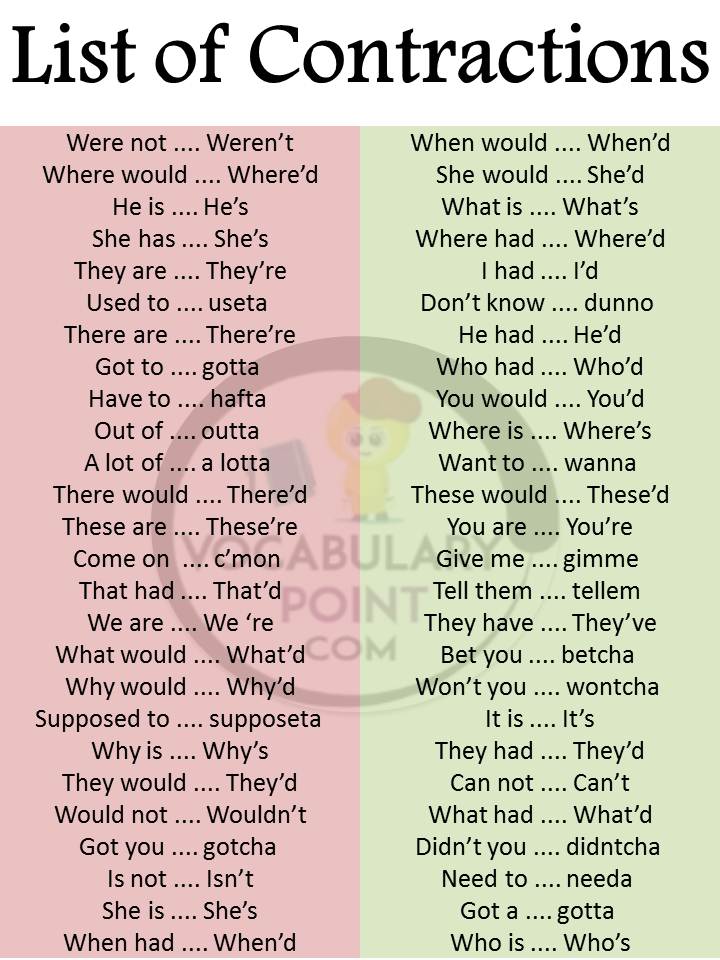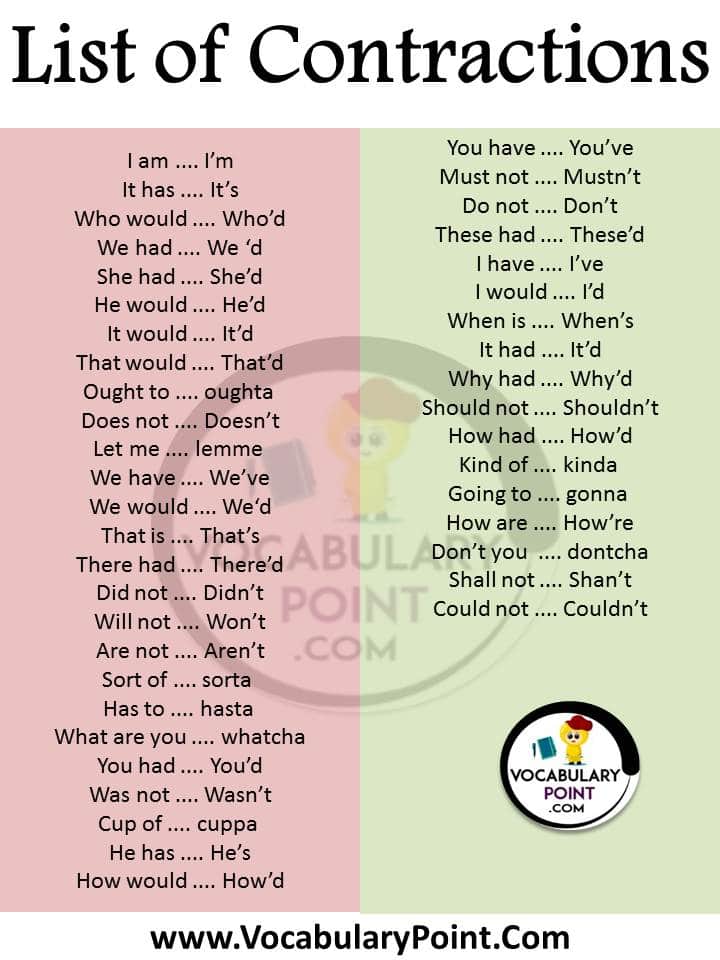Have you ever wondered why we say can’t instead of cannot, or it’s instead of it is? Contractions, the unsung heroes of language, play a crucial role in making our speech and writing more efficient and natural.
From casual conversations to formal documents, contractions add a touch of informality while maintaining clarity and precision. In this comprehensive guide, we will explore the fascinating world of contractions – from common ones like won’t and don’t to lesser-known gems like shan’t and mightn’t. So buckle up as we dive into the intriguing realm of contractions that shape the way we communicate every day.
What Are Contractions In English Grammar?
Contractions in English grammar are shortened forms of words or phrases, created by omitting certain letters and often replacing them with an apostrophe. They are commonly used in informal writing and everyday speech to make the language sound more natural and fluent. Contractions make sentences shorter and easier to pronounce, which is why they’re frequently used in spoken English.
Here are some common examples of contractions:
- I am becomes I’m
- You are becomes You’re
- He is becomes He’s
- We will becomes We’ll
- They have becomes They’ve
Contractions can combine subjects and verbs, verbs and words like “not,” and auxiliary verbs with “not.” For instance:
- Do not becomes Don’t
- Cannot becomes Can’t
- Would have becomes Would’ve
List Of Contractions
- I am – I’m (Combines the pronoun with the verb ‘am’.)
- You are – You’re (Fuses the pronoun with the verb ‘are’.)
- He is – He’s (Merges the pronoun with the verb ‘is’.)
- She is – She’s (Links the pronoun with the verb ‘is’.)
- It is – It’s (Joins the pronoun with the verb ‘is’.)
- We are – We’re (Combines the pronoun with the verb ‘are’.)
- They are – They’re (Fuses the pronoun with the verb ‘are’.)
- That is – That’s (Connects the demonstrative with the verb ‘is’.)
- Who is – Who’s (Merges the pronoun with the verb ‘is’.)
- I will – I’ll (Combines the pronoun with the modal ‘will’.)
- You will – You’ll (Fuses the pronoun with the modal ‘will’.)
- He will – He’ll (Merges the pronoun with the modal ‘will’.)
- We will – We’ll (Links the pronoun with the modal ‘will’.)
- Do not – Don’t (Combines the auxiliary verb with ‘not’.)
- Cannot – Can’t (Condenses ‘can not’ into a single word.)
- Would have – Would’ve (Joins the modal with ‘have’.)
- She will – She’ll (Combines the pronoun with the modal ‘will’.)
- They will – They’ll (Fuses the pronoun with the modal ‘will’.)
- It will – It’ll (Merges the pronoun with the modal ‘will’.)
- There is – There’s (Condenses ‘there is’ into one contraction.)
- There are – There’re (Combines ‘there are’ into a contraction.)
- There will – There’ll (Fuses ‘there will’ into one contraction.)
- Is not – Isn’t (Merges ‘is’ and ‘not’ into one word.)
- Are not – Aren’t (Joins ‘are’ and ‘not’ into one word.)
- Was not – Wasn’t (Combines ‘was’ and ‘not’ into a single contraction.)
- Were not – Weren’t (Fuses ‘were’ and ‘not’ into one word.)
- Have not – Haven’t (Condenses ‘have’ and ‘not’ into one word.)
- Has not – Hasn’t (Joins ‘has’ and ‘not’ into one contraction.)
- Had not – Hadn’t (Combines ‘had’ and ‘not’ into one word.)
- Could not – Couldn’t (Condenses ‘could’ and ‘not’ into one word.)
- Should not – Shouldn’t (Merges ‘should’ and ‘not’ into one word.)
- Would not – Wouldn’t (Joins ‘would’ and ‘not’ into one contraction.)
- Will not – Won’t (Unique contraction that seems to deviate from typical forms.)
- Must not – Mustn’t (Combines ‘must’ and ‘not’ into one contraction.)
- Does not – Doesn’t (Fuses ‘does’ and ‘not’ into one word.)
- Did not – Didn’t (Merges ‘did’ and ‘not’ into one contraction.)
- May not – Mayn’t (Rare contraction of ‘may’ and ‘not’.)
- Might not – Mightn’t (Combines ‘might’ and ‘not’ into one word.)
- Let us – Let’s (Condenses ‘let us’ into a casual invitation or suggestion.)
- You had – You’d (Can indicate either ‘you had’ or ‘you would’.)
- We had – We’d (Can indicate either ‘we had’ or ‘we would’.)
- They had – They’d (Can indicate either ‘they had’ or ‘they would’.)
- He had – He’d (Can indicate either ‘he had’ or ‘he would’.)
- She had – She’d (Can indicate either ‘she had’ or ‘she would’.)
- It had – It’d (Can indicate either ‘it had’ or ‘it would’.)
- Who would – Who’d (Merges ‘who’ with ‘would’.)
- Who had – Who’d (Also can mean ‘who had’.)
- Who will – Who’ll (Combines ‘who’ with ‘will’.)
- I have – I’ve (Condenses ‘I have’.)
- You have – You’ve (Merges ‘you have’.)
- We have – We’ve (Combines ‘we have’.)
- They have – They’ve (Joins ‘they have’.)
- What is – What’s (Fuses ‘what is’ or ‘what has’.)
- What has – What’s (Also means ‘what has’.)
- What will – What’ll (Combines ‘what will’ into a contraction.)
- What would – What’d (Merges ‘what would’ or ‘what had’.)
- Where is – Where’s (Joins ‘where is’ or ‘where has’.)
- Where has – Where’s (Also means ‘where has’.)
- Where will – Where’ll (Condenses ‘where will’.)
- When is – When’s (Combines ‘when is’ or ‘when has’.)
- When has – When’s (Also means ‘when has’.)
- Why is – Why’s (Fuses ‘why is’ or ‘why has’.)
- Why has – Why’s (Also means ‘why has’.)
- How is – How’s (Merges ‘how is’ or ‘how has’.)
- How has – How’s (Also can mean ‘how has’.)
- How will – How’ll (Condenses ‘how will’ into one contraction.)
English Language Contractions List
- I’m – I am shortened
- You’re – You are abbreviated
- He’s – He is condensed
- She’s – She is compressed
- It’s – It is brief
- We’re – We are brief
- They’re – They are short
- I’ve – I have contracted
- You’ve – You have shortened
- We’ve – We have shortened
- They’ve – They have shortened
- Isn’t – Is not abbreviated
- Aren’t – Are not shortened
- Wasn’t – Was not condensed
- Weren’t – Were not compressed
- Haven’t – Have not brief
- Hasn’t – Has not brief
- Hadn’t – Had not brief
- Won’t – Will not compressed
- Wouldn’t – Would not abbreviated
- Don’t – Do not shortened
- Doesn’t – Does not brief
- Didn’t – Did not brief
- Can’t – Cannot abbreviated
- Couldn’t – Could not brief
- Shouldn’t – Should not brief
- Mightn’t – Might not compressed
- Mustn’t – Must not shortened
- That’s – That is brief
- Who’s – Who is brief
- What’s – What is compressed
- Where’s – Where is shortened
- When’s – When is brief
- Why’s – Why is brief
- How’s – How is brief
- There’s – There is brief
- Here’s – Here is brief
- Let’s – Let us brief
- I’ll – I will brief
- You’ll – You will brief
- He’ll – He will brief
- She’ll – She will brief
- We’ll – We will brief
- They’ll – They will brief
- Ain’t – Am not informal
- Ma’am – Madam abbreviated
- Y’all – You all regional
- O’clock – Of the clock
- ‘Tis – It is poetic
- ‘Twas – It was poetic
- ‘Twould – It would poetic
- ‘Twere – It were poetic
- Daren’t – Dare not brief
- Needn’t – Need not brief
- Shan’t – Shall not brief
- There’d – There would brief
- There’ll – There will brief
- There’ve – There have brief
- Where’d – Where did brief
- Where’ll – Where will brief
- Where’ve – Where have brief
- Who’d – Who would brief
- Who’ll – Who will brief
- Who’ve – Who have brief
- Why’d – Why did brief
- Why’ll – Why will brief
- Why’ve – Why have brief
- How’d – How did brief
- How’ll – How will brief
- How’ve – How have brief
- What’ll – What will brief
- What’ve – What have brief
- When’d – When did brief
- When’ll – When will brief
- When’ve – When have brief
- I’d – I would brief
- You’d – You would brief
- He’d – He would brief
- She’d – She would brief
- It’d – It would brief
- We’d – We would brief
- They’d – They would brief
- Y’know – You know informal
- Gimme – Give me informal
- Gonna – Going to informal
- Gotta – Got to informal
- Wanna – Want to informal
- Kinda – Kind of informal
- Lemme – Let me informal
- Outta – Out of informal
- Lotta – Lot of informal
- ‘Fore – Before abbreviated
- ‘Cause – Because abbreviated
- ‘Bout – About abbreviated
- ‘Less – Unless abbreviated
- ‘Round – Around abbreviated
- ‘Em – Them abbreviated
- ‘Neath – Beneath poetic
- ‘Mongst – Amongst poetic
- ‘Twixt – Betwixt poetic


You can download a list of contractions in English grammar pdf
